The Conservative Anti-Trump Club
George Will, Glenn Beck, Karl Rove, John Podhoretz and many others aim their poison pens at the GOP frontrunner
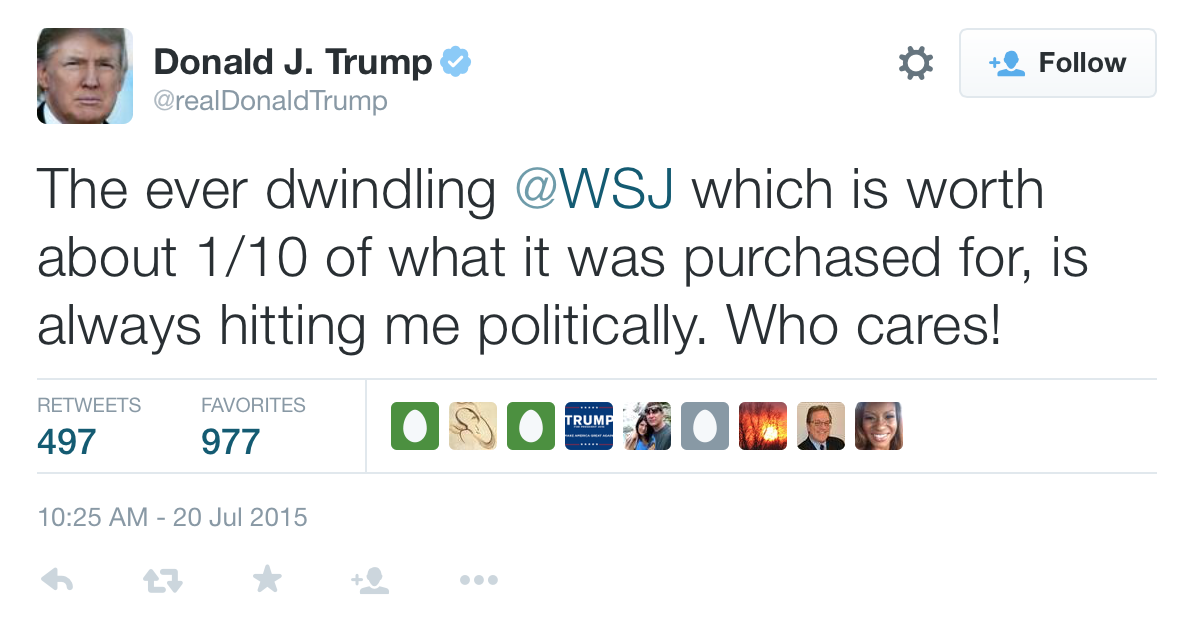
In my post yesterday about the #NROrevolt Twitter rebellion by restrictionist Donald Trump fans against the pro-restrictionism National Review, I mentioned that there was a rich stream of apoplectically anti-Donald Trump commentary emanating from within the conservative media. I thought it might be useful to catalogue some of the vituperative and often entertaining arguments thus far into one place. (For a previous post on Trump's conservative-media supporters, click here.)
The following list, encompassing neoconservatives, social cons, and libertarian-leaners, includes Bret Stephens, George Will, Glenn Beck, Michael Gerson, Charles C.W. Cooke, Karl Rove, Jonah Goldberg, John Podhoretz, Kevin D. Williamson, Mona Charen, Noah Rothman, Jennifer Rubin, and Max Boot. Those with multiple entries have theirs presented in chronological order. Please leave other suggestions in the comments. Without further ado:
Bret Stephens, Wall Street Journal, Aug. 31, "The Donald and the Demagogues." Sample:
If by now you don't find Donald Trump appalling, you're appalling. […]
When people become indifferent to the ideas of their would-be leaders, those leaders become prone to dangerous ideas. Democracies that trade policy substance for personal charisma tend not to last as democracies. They become Bolivarian republics. Donald Trump may be America's Hugo Chávez, minus the political consistency.

George Will, Washington Post, Aug. 13, "Donald Trump is a counterfeit Republican." Sample:
He is an affront to anyone devoted to the project William F. Buckley began six decades ago with the founding in 1955 of the National Review — making conservatism intellectually respectable and politically palatable. Buckley's legacy is being betrayed by invertebrate conservatives now saying that although Trump "goes too far," he has "tapped into something," and therefore.?.?.?.
Therefore what? This stance — if a semi-grovel can be dignified as a stance — is a recipe for deserved disaster. Remember, Henry Wallace and Strom Thurmond "tapped into" things.
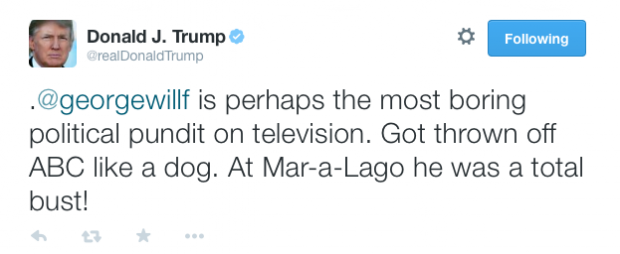
George Will, Washington Post, Aug. 21, "Trump's immigration plan could spell doom for the GOP." Sample:
It has come to this: The GOP, formerly the party of Lincoln and ostensibly the party of liberty and limited government, is being defined by clamors for a mass roundup and deportation of millions of human beings. To will an end is to will the means for the end, so the Republican clamors are also for the requisite expansion of government's size and coercive powers. […]
Today's big government finds running Amtrak too large a challenge, and Trump's roundup would be about 94 times larger than the wartime internment of 117,000 persons of Japanese descent. But Trump wants America to think big. The big costs, in decades and dollars (hundreds of billions), of Trump's project could be reduced if, say, the targets were required to sew yellow patches on their clothing to advertise their coming expulsion. There is precedent.
George Will, Aug. 26, Washington Post, "The havoc that Trump wreaks—on his own party." Sample:
Every sulfurous belch from the molten interior of the volcanic Trump phenomenon injures the chances of a Republican presidency. After Donald Trump finishes plastering a snarling face on conservatism, any Republican nominee will face a dauntingly steep climb to reach even the paltry numbers that doomed Mitt Romney.
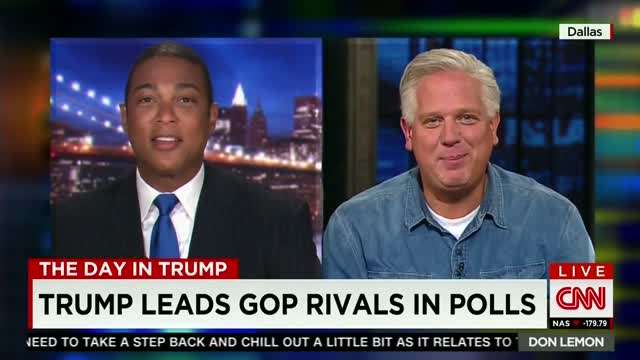
Glenn Beck, Facebook, Aug. 14, untitled. Sample:
He is part of the problem when he by his own admission, buys politicians; he said he identifies his "policies more as a democrat"; he makes President Obama look truly humble; he was very pro abortion until very recently; he still says "don't defund planned parenthood"; he is pro "assault weapon ban"; he is in favor of a wealth tax that would just "take money out of people's bank accounts"; he is for boots on the ground in Iraq and 'taking the oil' from the Iraqi people; he is a progressive 'republican'; he says single payer health care works; he said he would give people more than just Obama care; the First Lady would be the first to have posed nude in lesbian porno shots; he said that he keeps all the bibles he is given in a "special place" out side the city - and he only goes to church on Christmas and Easter; he is generally not a likable guy; he has around 16% favorability with Hispanics and he has gone bankrupt 4 times.
This is an honest question. I really want to understand:
Why are big name "conservatives" supporting him?

Michael Gerson, Washington Post, Aug. 10, "Donald Trump will inevitably flame out. Here's why." Sample:
He thinks that a Trump-branded White House might actually be possible. It is not a view held by any serious political observer. That doesn't matter. Some public figures — Harold Stassen, Eugene McCarthy — never recovered from the beatific vision, and spent the rest of their lives trying to recover it.
Trump will flame out. And since he is constitutionally incapable of accepting fault, he will blame the GOP for arson. As someone prone to conspiracy theories — on presidential birth records, vaccines and the scheming Mexican government — Trump is probably gathering string to prove a plot against him involving Megyn Kelly, the GOP establishment and the American Gynecological and Obstetrical Society.
Michael Gerson, Washington Post, Aug. 31, "Trump declares war on America's demography." Sample:
"I don't want it to be about me," Donald Trump explained at a recent event in Nashville. In other news: War is Peace. Freedom is Slavery. Ignorance is Strength.
The Trump campaign is emphatically about Trump, in a manner typical of populism from Huey Long to Hugo Chavez. The people are infallible, but they require someone who embodies their collective wisdom. The country — betrayed by elites, beset by foreigners, exploited and humiliated at every turn — needs more than policy papers. It needs a savior.

Charles C.W. Cooke, National Review, Aug. 10, "The Trump Virus and Its Symptoms." Sample:
A plague is sweeping the land, gathering victims of all shapes and sizes and turning them into fools. Its name — for now — is Trumpism.
The Trump virus's primary effect is twofold: First, it implants in its hosts the unshakable conviction that one of the most execrable clowns in the history of these United States is a hero who deserves to be elevated to the White House; then, having inculcated the conceit, it removes the faculties that are necessary for its removal. The results are ruinous.
Charles C.W. Cooke, National Review, Sept. 1, "Trump Has Succeeded in Convincing Conservatives to Discard their Principles Overnight." Sample:
A handful of months ago many of those who now make up Trump's rank-and-file were ideological perfectionists who hated the GOP's leadership, believed to their souls that the country was becoming a socialist hell-hole, and insisted vehemently that they had sat out the 2012 election because Mitt Romney was such a terrible squish. Today, by dint of some dark and unholy magic, these wannabe purists have hitched their wagons to Donald Trump, the greatest shape-shifter of them all.
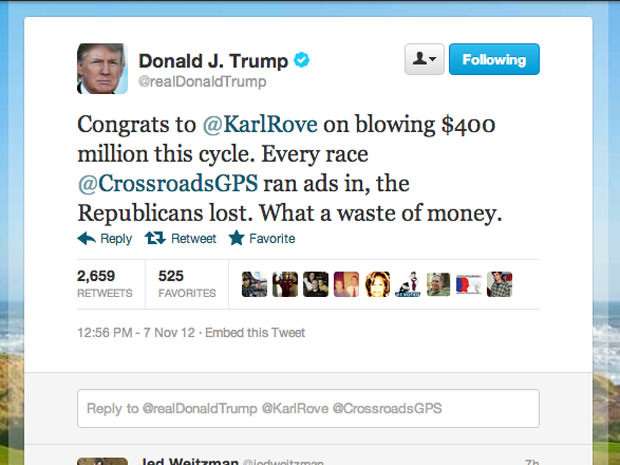
Karl Rove, Wall Street Journal, Aug. 5, "Which Donald Trump Will Debate?" Sample:
Over the years he's held many conflicting positions on many important issues.
Will the Trump who walks on stage Thursday night be the one who in 1999 told CNN's Larry King that "I'm quite liberal and getting much more liberal on health care"? The one who wrote in his 2000 book, "The America We Deserve," that the U.S. should consider a single-payer health system like Canada's government-run plan? That system "helps Canadians live longer and healthier than Americans," this Trump wrote. "We need, as a nation, to re-examine the single-payer plan, as many individual states are doing." Or will debate viewers instead get the Donald Trump who earlier this year called ObamaCare a "filthy lie" and "total catastrophe"?
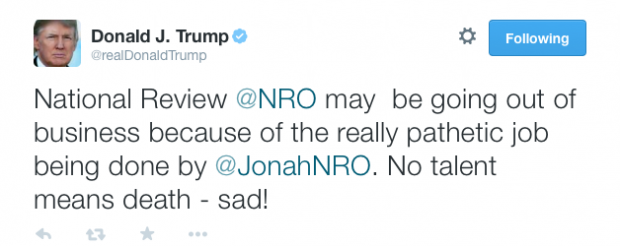
Jonah Goldberg, Los Angeles Times, July 7, "Trunp is a bad deal for the GOP." Sample:
This attitude helps explain why Trump is such a fan of eminent domain. The man seeking the tea party's support loves to use the government to seize private land he can't — or doesn't want to — buy fairly.
Given the fetid swamp of sanctioned corruption that passes for commerce in New York, it's no wonder he sees nothing wrong with greasing the skids by funding liberal politicians. But one might expect a person who claims to be a conservative to at least pay some rhetorical tribute to virtue while admitting his vice. Alas, it is axiomatic that the shameless are incapable of exhibiting shame.
Jonah Goldberg, National Review, Sept. 5, "No Movement That Embraces Trump Can Call Itself Conservative." Sample:
Well, if this is the conservative movement now, I guess you're going to have to count me out. […]
[I]f it's true that politicians can disappoint, I think one has to say that the people can, too.
And when I say "the people" I don't mean "those people." I mean my people. I mean many of you[.] […]
It is catharsis masquerading as principle, venting and resentment pretending to be some kind of higher argument. Every principle used to defend Trump is subjective, graded on a curve. Trump is like a cat trained to piss in a human toilet. It's amazing! It's remarkable! Yes, yes, it is: for a cat. But we don't judge humans by the same standard.
John Podhoretz, Commentary, July 27, "Trump: The Case for Despairing—About America." Sample:
The issue with Trump is that his approach can only be called "the politics of unseriousness." He engages with no issue, merely offers a hostile and pithy soundbite bromide about it. He yammers. He describes how wonderful things will be when he acts against something or other without explaining how he will act, what he will do, or how it will work.
The Trump view, boiled down: They're all idiots and I'm very rich and I know how to do things and if you say Word One against me I will say something incredibly nasty about you and who cares about how the Senate works or the House works or international alliances work or how treaties work or how anything works. That stuff is for sissies and losers and disasters. I know how to do it I me me me I me me I I me. And me. And I.
John Podhoretz, New York Post, Aug. 25, "Donald Trump's appeal—an Obama for the right." Sample:
Candidates struggle to be consistent, or to explain their changes of opinion if they find themselves making those changes. Not Trump, who was able in less than one minute earlier this week to say he supports a flat tax — in which everyone in the country pays the same rate — and wants rich people to pay at a higher rate.
At any other time in American history, such an answer would make him a laughing-stock. Not Trump. He's laughing all the way to the polling bank.

Kevin D. Williamson, National Review, June 16, "Witless Ape Rides Escalator." Sample:
Donald Trump, being Donald Trump, announced his candidacy at Trump Tower, making a weird grand entrance via escalator — going down, of course, the symbolism of which is lost on that witless ape. But who could witness that scene — the self-made man who started with nothing but a modest portfolio of 27,000 New York City properties acquired by his millionaire slumlord father, barely out of his latest bankruptcy and possibly headed for another one as the casino/jiggle-joint bearing his name sinks into the filthy mire of the one U.S. city that makes Las Vegas look respectable, a reality-television grotesque with his plastic-surgery-disaster wife, grunting like a baboon about our country's "brand" and his own vast wealth — and not see the peerless sign of our times?
Kevin D. Williamson, National Review, June 21, "The Art of the Con, by Donald Trump." Sample:
Trump brings out two of the Right's worst tendencies: the inability to distinguish between entertainers and political leaders, and the habit of treating politics as an exercise in emotional vindication.
Whatever Trump's appeal is to the Right's populist elements, it isn't policy. He is a tax-happy crony capitalist who is hostile to free trade but very enthusiastic about using state violence to homejack private citizens — he backed the Kelo decision "100 percent" and has tried to use eminent domain in the service of his own empire of vulgarity — and generally has about as much command of the issues as the average sophomore at a not especially good college, which is what he was (sorry, Fordham) until his family connections got him into Penn.
Kevin D. Williamson, National Review, July 28, "Fifteen Elephants and a Clown." Sample:
If you are looking for a good reason to quit the Republican party (as I did some years ago), you can start with the company you are obliged to keep in the GOP: At the moment, about one in five Republicans are rallying to the daft banner of Donald Trump, heir to a splendid real-estate fortune and reality-show grotesque, who is a longtime supporter of, among other Democratic potentates, Hillary Rodham Clinton, who remains, for the moment, the candidate against whom the Republican nominee presumably will run. […]
He has been a very public figure for decades, with a great deal of time, money, celebrity, business connections, and other resources to put in the service of something that matters. Seventy years in, and his curriculum vitae is remarkably light on public issues for a man who would be president. One would think that a life spent in public might inspire at least a smidgen of concern about the wide world. He might have had any sort of life he chose, and Trump chose a clown's life.
Kevin D. Williamson, National Review, Aug. 6, "Donald Trump and the American Id." Sample:
Donald J. Trump feels the need to lie a great deal about Donald J. Trump's success. Example: He has claimed, repeatedly, that his Art of the Deal is the best-selling business book of all time. It has been very successful, selling around 1 million copies since its publication in 1987. But it hasn't sold a quarter of the books that the relatively recent Good to Great and Rich Dad, Poor Dad have sold, and its sales are barely a rounding error on those of such perennials as How to Win Friends and Influence People and The Seven Habits of Highly Effective People. Walter Isaacson's recent biography of Steve Jobs has sold three times as many copies as The Art of the Deal. Selling 1 million books is no mean feat, but where Trump is concerned, Trump deals exclusively in superlatives: the biggest, the best, the classiest, etc.
None of that is ever true, of course. Trump-branded shirts and ties at Macy's weren't the best, finest, classiest, most stylish shirts and ties to be had; they weren't even the best shirts you could get at Macy's. Trump-branded casinos and hotels are not the best, most luxurious, most high-end accommodations in the world — they're embarrassing, and the people sipping cocktails at the Sky Lobby bar at the Mandarin Oriental in Vegas are not secretly wishing they were at the Trump. Trump Tower is far from the nicest residential building in its neighborhood, much less in all of New York City. Trump-branded golf courses are not the greatest golf courses in the world. The Apprentice isn't the top-rated reality-television show in the history of that sorry genre.
This is what rich-kid's disease looks like when the rich kid is pushing 70.
Mona Charen, National Review, July 10, "The Trump Sideshow Plays Right into Democrats' Hands." Sample:
Just when the Republican party needs finesse and sensitivity when discussing immigration; just when it needs to focus on issues that unite all sectors of the electorate, including Hispanic and Asian voters; it gets a blowhard with all the nuance of a grenade. […]
Trump has achieved his objective — making himself the center of attention — but he has subtracted from our sum total of knowledge about the immigration issue. According to an analysis of Census Bureau data by the Immigration Policy Center, only 1.6 percent of immigrant males between the ages of 18 and 39 are incarcerated, compared with 3.3 percent of the native-born. There are terrible stories of immigrants committing crimes, and it's certainly fair to demand that criminal aliens be deported with dispatch. Sanctuary cities are a disgrace. But just as Dylann Roof doesn't represent white people, Mexican rapists don't represent anyone other than themselves either.
Mona Charen, Chicago Sun-Times, July 23, "Visions of a post-Trump GOP." Sample:
Whatever one's views about immigration, the very worst way to broach the topic is to smear all Mexican illegals as "rapists" and criminals. It's obviously false. It's not even true that illegal immigrants commit a disproportionate share of crimes. Honest anti-immigration groups like the Center for Immigration Studies agree that first-generation immigrants are less likely to commit crimes than native-borns. (And immigration rates are falling.
Mona Charen, Townhall.com, Aug. 21, "Taking Our Country Back: From Whom?" Sample:
Illegal immigration is declining. Between 1990 and 2007, the number of illegal immigrants tripled. In 2000, an estimated 1.6 million illegals entered the United States. Since 2012, that number has dropped to about 400,000 (even accounting for the flood of underage migrants last year).
We've built fences along all but the most inaccessible areas along the border. Over the past decade, we've spent $10.7 billion on fences, cameras and other measures, including doubling the number of border patrol agents to 18,000. We've also spent billions on biometric identity management and other things, bringing the total expenditure for border control to $16.2 billion last year. Those truly serious about ending illegal immigration altogether must grapple with national identity cards. Another fence isn't going to do it. Forty percent of illegals are visa overstays.
Noah Rothman, Commentary, Aug. 25: "Never Fall in Love." Sample:
Donald Trump is a Republican out of convenience. Since Ronald Reagan, he has supported every president of both parties when they were popular, and he has turned on them when they fell out of public favor toward the end of their terms in office. It makes sense that Trump would eschew fealty to a party with which he is only marginally affiliated. Moreover, it isn't surprising that Trump's supporters, many of whom are voters with even less attachment to the GOP or are outright hostile toward the Republican Party, should fail to see this as a flaw in the candidate's character.
Rejecting absolute fidelity is a condition that goes both ways. Should Trump emerge the party's standard-bearer, it would signal a rejection of almost every principle for which conservatism stands.
Jennifer Rubin, Washington Post, Aug. 9, "Donald Trump is no bully. He's a crybaby." Sample:
Trump and his supporters then spent a good deal of Friday bellyaching that Fox had been too tough on him. He crudely insulted Megyn Kelly. He whined, "I think the questions to me — and that's why I'm so honored — the questions to me were much tougher than the questions to anybody else." Actually, they weren't. Trump's defenders deep in the heart of the right-wing echo chamber were incensed Trump would be asked to defend his record and egregious language. For a group that dishes it out unmercifully to every insufficiently conservative Republican and to all liberals, they sure seem squeamish when their pet candidate is on the receiving end. […]
The problem is that Trump isn't a real candidate and is not a real front-runner. He's the flavor of the month, the Don Rickles of politics, a bully and a buffoon. He brags that he made millions in Atlantic City while firing over a thousand workers and that he gave money to Hillary Clinton to get her to come to his wedding. (Why would he want her there? No other GOP contender would.) He revels in his ignorance. As such, he is getting nowhere near the White House (even by invitation).
Jennifer Rubin, Washington Post, Aug. 30, "The anti-Trump angst grows." Sample:
These Republicans, on one hand, despair that an egocentric bully with no discernible political principles should be leading in polls. They observe that his incoherent mix of authoritarianism, protectionism and cronyism is antithetical to the modern conservative movement, and in tone is 180 degrees from Ronald Reagan. But they also note that he is building an organization and displaying "P.T. Barnum showmanship," as one veteran of GOP presidential campaigns put it. They shake their heads, unable to fully comprehend Trump's appeal, but more than that they are disturbed by the rest of the field. They do not believe Trump will be the nominee, but high hopes for a deep, quality field have not been met. In particular, they are worried that Trump's embrace of "nativism" will doom the party if mimicked by others.
Max Boot, Commentary, Aug. 18, "Donald Trump's Remarkably Consistent Inconsistency." Sample:
That Washington Post article, damning as it is, barely scratches the surface of his confusion. This is, after all, the candidate who in March slammed Obama's handling of Ukraine, saying: "We should definitely do sanctions, and we have to show some strengths. I mean, Putin has eaten Obama's lunch, therefore our lunch, for a long period of time."
And now Trump has this to say about Ukraine: "I don't like what's happening with Ukraine. But that's really a problem that affects Europe a lot more than it affects us. And they should be leading some of this charge… Why are we leading the charge in Ukraine?"
I will be updating this post with new additions.


Show Comments (241)